Google Translate Review
What is Google Translate?
Google Translate is one of the most widely used machine translators worldwide, recognized for its free access, cross-platform availability, and constant evolution driven by artificial intelligence. Its neural translation system allows for interpretation of texts between more than 150 languages, optimizing understanding through context, although Google does not publish specific accuracy metrics. The tool provides real-time translations of text, voice, images, and documents, all from a single intuitive interface, compatible with mobile devices and browsers.
✅Coverage of more than 150 languages, including dialects and variants of Spanish, with real-time translation.
✅Support for translation of text, voice, images, and documents, all from a single interface.
✅Full integration with the Google ecosystem, including Chrome, Gmail, and Google Docs.
Very intuitive; no registration required.
100% free for all users.
Prices and Plans
The price of Google Translate is
100% Free .
For more details on the different plans, we recommend visiting their website.
Advantages and Disadvantages
Advantages
- Travelers, students, or users who need fast and varied translations.
- Real-time translation of conversations, menus, signs, and short documents.
- Users looking for free, hassle-free translation from any device.
Disadvantages
- Technical, legal, or scientific translations that require high terminological precision.
- Professional teams that need terminology control or customized glossaries.
- Cases where attention to style and tone is required in formal documents.
Google Translate vs Alternatives
Explore other tools on our platform to find the one that best suits your needs.
AgentAya Verdict
User Opinion
Google Translate is a popular and efficient tool that facilitates communication between different languages thanks to its ability to translate text, voice, and images in real time. With an average rating of 4.6 out of 5 on G2.com, users praise its speed, extensive language coverage, and ease of use in various formats, such as documents or scanned content. However, some note that it can have accuracy limitations when it comes to technical, highly formal, or translations with complex cultural nuances, suggesting that its performance is optimal for everyday situations but not always ideal for specialized texts.

